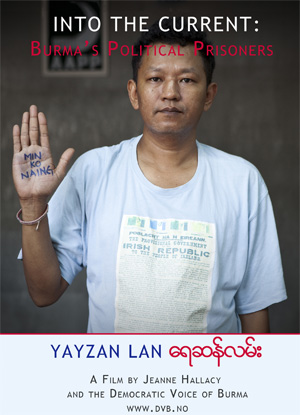I had the privilege of moderating a post-screening discussion of Into the Current this past Sunday. The documentary about Myanmar’s political prisoners was both shocking and inspiring. Many of us left the theatre awed by the courage and determination of the men and women who sacrificed so much in their fight for freedom.
One of the documentary’s key characters is activist and former political detainee, Bo Kyi. Jailed seven years for taking part in Myanmar’s pro-democracy movement in 1988, he now runs Assistance Association for Political Prisoners. As part of my research, I emailed Bo Kyi some questions prior to the screening. His replies are both sobering and enlightening.
Lynn:
Have things improved in Myanmar given the government’s push towards more “openness”?
Bo Kyi:
The celebrated reforms instigated by the quasi civilian Thein Sein administration in Burma are largely confined to the media and financial sector, and therefore have had little to no impact on the human rights environment. The people of Burma, especially those who dare to exercise their fundamental freedoms, face the same harassment and abuse as they did under military rule. Fear that criticizing the state will lead to imprisonment is real.
AAPP continues to monitor the government’s lack of respect for human rights in Burma, and has found that since January 2012, there have been at least 200 politically motivated detentions, with less than 60 of them resulting in formal court proceedings. This shows that arbitrary arrests remain a favored tool of repression of both the current administration and previous military regimes.
My organization, AAPP, warmly welcomes the freedom of any political prisoner. However, released political prisoners are not really free. They are not free to meet openly with their friends and family, and they are not free to pursue their activist work. The heavy restrictions faced by former political prisoners is institutional and systematic. They are stripped of their professional licenses, such as their lawyer or medical licenses; are blocked from pursuing their university studies; and are barred from receiving passports. It is short sighted to look solely at the release of political prisoners as a sign of change in Burma, the real test of the reforms is how political prisoners are treated after their release.
Under U Thein Sein, political prisoners are released conditionally, often under section 401, which means they can be re-arrested at any time without a warrant and made to serve the remainder of their sentences. They are also released as “criminals,” as the U Thein Sein administration still officially denies political prisoners exist in Burma.
At least 284 plus political prisoners remain behind bars. All that is needed to secure their release, and empty all of Burma’s prisons of political prisoners, is a presidential order. And yet, President Thein Sein has not taken this simple step, indicating there is still no genuine motivation towards ending the long tradition of political prisoners in Burma.
Lynn:
Do you have any thoughts on the Rohingya crisis, or on what is happening in Kachin state?
Bo Kyi:
The escalation of violence in ethnic minority areas, such as Arakan and Kachin State, is horrible, and has led to a security black hole where there are absolutely no laws. Women are used as sex slaves by Burma Army soldiers, local authorities torture innocent IDPs with impunity, and the list goes on. This is what is happening right now, not 20 years ago when Burma was under military rule, and all while foreign governments praise the reforms in Burma. The administration would like us to ignore what is happening in ethnic minority areas in conflict, but we must not let them do that.
The president of Burma does not have the capacity nor the political will to control the violence consuming ethnic minority regions. This is evident in the unfortunate events plaguing Arakan State since June 2012. The president made a number of bad decisions that has only worsened the situation. For example, there have been restrictions on humanitarian access to affected areas, leaving victims in critical conditions without food, shelter, or safety. No security has been provided to those under attack, and instead we are seeing sweeping arrests, killings, and rape by the Burmese local security forces. Worse, the president has not addressed the root causes of the conflict, which is essential to preventing further violence. I feel sorry to learn that the very recent crackdown by the Burmese government in Arakan State has resulted in more than 60 deaths and 60 injuries.
The government’s lack of capacity is mirrored in Kachin State, where civil war continues to rage on, displacing large portions of the population. The government of Burma must be more forceful in ordering the Burma Army to stop its attacks against ethnic resistance groups. The people of Kachin State are constantly at risk of torture, sexual violence, and arrest by the Burma Army soldiers, and yet neither the Army nor the government has taken any responsibility, not even acknowledging, this most grave violation of human rights.
For both Arakan and Kachin State, the government of Burma must condemn the violence that is taking place, and make a genuine effort to work towards a lasting solution for an end to the conflict. The people of Kachin and Arakan State deserve more than mere lip service.
Lynn:
Would you like me to say anything on your behalf to the audience?
Bo Kyi:
Thank you for your interest in Burma and the country’s political prisoners. Just by watching Into the Current, you are ensuring the remaining political prisoners in Burma are not forgotten or left behind. That their stories are heard far and wide means a lot to those still behind bars. Please, continue to raise awareness on the desperate human rights situation in Burma, by speaking with your family or friends, or hosting a film viewing at your local university or library. Every little bit helps. Thank you for learning more about our struggle for human rights in Burma.


